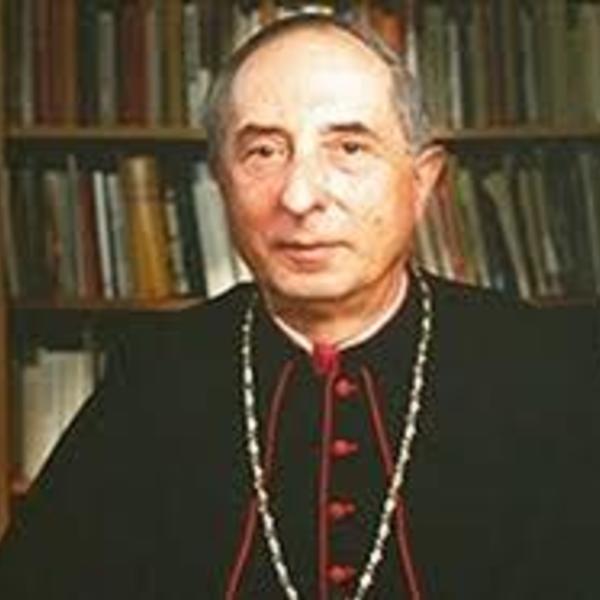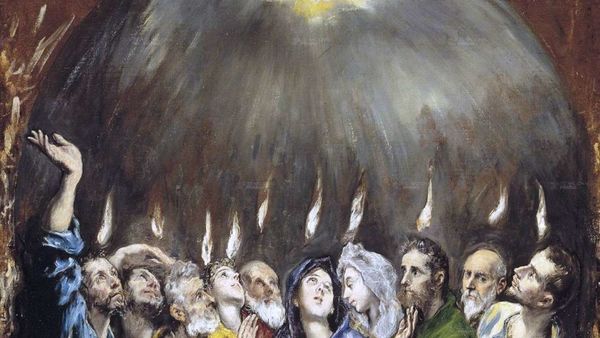A new ontology is sought, an ontology which starts out from what is proper to Christianity. But whence does the properly Christian come into view? It cannot, in the present context, be specified by a historical investigation which reflects on singularities, parallels, and influences, nor by a systematic elaboration of what makes up the central content of the Christian faith. Instead a differential analysis is appropriate to what we have in mind here. In what way are the fundamental human experiences and fundamental understandings of God, the world, and human beings altered when faith in Jesus Christ breaks in upon them?
The double a priori under which theology stands can be seen in the following way: the attempt at the new, at the immediately Christian, is deciphered in the medium of the human, is read off from the “old,” in which the newness of what is Christian is demonstrated.
Context: Religion
The experience of believing in Jesus Christ plays out, first of all, in the context of the fundamental human phenomenon of religion. Religion—and this goes for the Christian religion too—is distinguished from other inquiries into meaning and other final answers by a displacement, peculiar to religion, of its center of gravity. The human being no longer lives his life or understands his world from his own point of view, but rather from that of an Other who has withdrawn from him. The axis upon which life turns is not that of human questioning or human capacities, but that of the advent of this Other, of his irruption, his call, his epiphany, his communication, his revelation. This Other’s overcoming of us is not, however, merely external: it discloses this Other as that upon which I and my world are most intimately dependent, and that from which I have most inwardly come to be.
The claim of religion is essentially total—and it is, in a twofold way, essentially paradoxical. It is a paradox that I am not the center, not the starting point, that I do not live of my own accord, but that I cede the leading role, the whence and whither of my existence. It is equally a paradox that that which is other than everything and different from everything nevertheless becomes a part of everything, becomes something within everything’s horizon, becomes something concrete amongst what is concrete. Religion is grounded in the transcendent’s making an incursion into immanence without giving up its claim to be transcendent. One could speak of a reciprocal transcensus [Transzenzus].
In this way, religion finds itself in a twofold aporia, which leaves it, ever and again, questionable for human beings. On the one hand, religion’s claim to be everything, to be the whole, is resisted by the I’s ineliminable driving force, its interest, the necessity of initiating matters under which the I finds itself, the necessity of proceeding from out of itself. Religion becomes an exorbitant demand. On the other hand, the banality of everyday experience asserts itself; the urgency of the world and its relations vindicates itself against the claim of one particular relation to be the absolute relation. The claim of religion to be the most fundamental and most real relation appears as though it has been refuted by practicalities; this directly prompts the suspicion that religion is the unreal, is projection, is a mere addition to reality.
Human beings cannot, by themselves, completely solve this contradiction. They are either pressed down to the ground, squeezed into their own nothingness, by the weight of religion’s claim, with “woe is me,” in the end, as their last word; or they flee into the one and all of the divine. But in this latter way religion silently becomes a total and monistic system; the human being’s encounter with the divine is annulled, and, essentially, both human and divine forfeit their station. Or, finally, human beings make religion “bearable” by reducing it, by means of compromise, re-interpretation, or clarification. The only alternative from inside would be not to want to resolve this contradiction, but to endure ever new onsets of it, with an eye to hope.
Context: Experience of Logos
The experience of faith in Jesus Christ also plays out in another context, from which it is at the same time distinct: this can be described, to bring distinct phenomena very summarily together once again, as the experience of logos.
The human being starts out from himself. He discovers that he is present in everything which he discovers; he finds the traces of his own questioning and thinking in everything which his questioning and thinking encounter. The very connection, the way in which everything mirrors everything else, becomes a source of wonder, which fascinates him. His life means reconstructing this marvel, means wonderingly recovering the connection which he has discovered. He does not stand, as it were, over against religion, but right inside it. The last and the whole is greater than everything, and yet is in everything; but it is in everything not in a particular place, or in a particular way, but in everything as a whole, as the depth of everything.
Within this basic position—the experience of which has its place, as a moment, in Christianity too—there are various further positions. The “I” is reduced to a mere moment of the self-perficient reason of totality and of the world; the world and totality are reduced to a mere moment of reason’s path to itself, that reason which I am—either as this individual “I,” or as the subject, “I” in a transcendental sense. Another position is the following: reflection dissolves the connection which links me with everything else into something questionable, or, even, something meaningless, which leaves only one option: resignation, despair, nihilism. Or again: reflection relinquishes its constructive power or its destructive impotence, and becomes contemplation, which sees and respects the connection, which takes it as read, without ever taking it upon itself to say by whom what is read was written—a pure philosophical epoche.
Such an experience of logos seems to make possible a limitless openness, even to be a transcendental openness, which can display and reveal whatever is. But is the All which can be experienced transcendentally really all there is? Wherever experience and the constructive capacity of the logos, wherever non-experience of the logos or experience of the non-logos, or wherever a merely transcendental openness posit themselves as absolute, wherever these claim absolute finality, there the breadth of logos-experience is reversed into a fundamental narrowing. When we stipulate that the logos should concern me only in and with respect to the whole, and not with respect to what concretely confronts me, are we not setting limits in advance to what is promised in the all-embracing logos?
Preliminary Answer: The Ancient Covenant
Religion and the experience of logos are contexts and contrasts for faith’s encounter with Jesus Christ. The previous course of what belongs to and is proper to this faith takes place in Israel, in the religion of Yahweh.
In the religion of Yahweh, religion is made good and surpassed, and the fulfilment and overcoming of religion begins. Human beings stand over against God—but not only over against him. Human beings are no longer left alone; God, too, stands on the side of human beings. For God is the God of the covenant; he is the God of the whole covenant, and therefore also supports and underwrites the other party to the covenant. The “woe is me” remains powerful, but God’s hospitality, encouragement, and promise are more powerful.
The other aporia of religion is also unlocked, at least at first. However much Yahweh is the transcendent, the Other, he who is always greater, he is nevertheless just as much the God of history; life itself becomes the space of his revelation and the space in which he is encountered. The relationship to God includes the relationship to my neighbor. For the covenant is no longer one aspect of life alongside or beyond others, but embraces and governs all life’s aspects and domains. Even the experience of logos, however, is assimilated and surpassed; Yahweh is sole and transcendent, but he is not in competition with wisdom, which is mirrored in and which comes to fulfilment in all things, or with the logos, which reveals all connections and all secrets. Wisdom dwells with God, and the word, in which everything is created, lies with him. He is the God of the All, revealed in everything, and is at the same time above it and over against it; he has the power to act and to speak concretely, and his word has the right to say something more and something new, beyond that which we can gather from the world by means of our thinking or our wonder.
The New Covenant’s Answer to Religion and the Experience of Logos
Christianity is a radicalization and a conversion of religion. To live for the sake of God alone: this is the bearing of the conversion which corresponds to the coming of the Kingdom of God. Time is brought to fulfilment; the rhythm of mere hope culminates in a new, irrevocable present and presence of God. Human beings are called upon radically to forget their own age and to exchange it for the new age, that of the God who comes and who acts in Jesus Christ. One of the paradoxes of religion, to live for the sake of the Other, arrives, in this way, at its highest intensity.
The same thing also happens in the case of the second paradox. God enters, now that his dominion is dawning, into the horizon of history, and he does this in a singular, concrete place. There is no multiplicity of epiphanies; there is no longer any garland of revelations of the one secret; rather, the secret of the withdrawn God gathers and concentrates itself at a single point in history. This is the claim of Jesus, this the “stumbling- block” of his message.
Yet it is in this very intensification that religion experiences its conversion. The withdrawn source of everything, the God of the absolute origin and future, irrupts into a with-us and alongside-us. Our history, in a new sense, becomes his epiphany. It is no longer only as in the Old Covenant, in which God himself repeatedly steers and changes history, and, so to speak, reaches out his hand from above to direct and to support us. No, God is now there himself, in the same place where we are to give our answer. The fate of Jesus is God’s solidarity with us and his proximity to us, in the middle of the space of our own experience, precisely at the site of our own impotence.
Religion, and even the experience of the logos, are thereby integrated, turned inside out, and surpassed. Everything which is enters an all-embracing context. But it is not exhausted by what my thinking can gather from the phenomena by means of analysis, design, critique, or contemplation. The word which the world speaks to me is no longer only its word or my word. Instead, history becomes the word spoken by the God who is revealed in it, who, appearing and acting at a single point, unconceals and confers the meaning of the whole. Its context becomes the context of my and of our existence, becomes a word which I and we consummate from our own origin—but as an answer, not as the enforcement of a law upon us or in us, but as a lived up-towards, from personal origin to personal origin.
The Inner Center of What is Christian: The Threefold Event
God’s dominion is a conversion, a fulfillment and a surpassing of religion, and an experience of the logos—this, certainly, directs us towards the center of Christianity, but does not yet bring that center to light with the last clarity. We are directed towards this center by the Father’s proposition: Ipse est regnum caelorum. He means Jesus Christ.
In that Jesus Christ announces and brings the dominion of God, and in that we encounter this dominion in him, a radical, unreserved communication takes place between God and us. He himself shares in Jesus all of what is ours and all of what is his. Nothing of his is left outside the gift which he gives us in Jesus Christ; nothing of ours is left outside history, which is God’s own history.
Jesus Christ is, therefore, not merely an instrument of God’s dominion, a dominion which would in some way remain above him; and just as little is he God’s demise, his losing of himself into immanence, into the world and history. In Jesus, God comes into history in his entirety—and yet remains above it. Only where he remains over it is His presence in it curative and saving [heil-sam], redeeming.
The position of religion has changed: not a God above us, who presses us down into our own nothing or who sucks us up into his own all, but, instead, a God above us who encounters and answers the God who is among us, who catches, supports, and accepts us: we, between God and God.
Yet it is in just this way that we are ourselves. God does not merely do something to us when he gives us his Son, lets him take on our flesh, lets him, submissive even unto death, answer in our place. He does something for us, so that we, in him, are able to do “the same thing” in him and by virtue of him. What unites the God above us and the God in us, unconditional love, the Holy Spirit, is given to us so that, by virtue of that Spirit, we ourselves, borne up by the Son, may give his upbearing answer.
Here for the first time, too, the solitary situation of the logos in the context of totality is unlocked into the single entire relationship which binds together irreducible opposition and unbreakable unity.
Trinity is not a logical abstraction from exaggerated individual scriptural statements; it is not speculation which busily stretches out tentative beginnings into cut-and-dried rationality. It is a statement of the fundamental experience of how human beings are newly given to God and newly given to themselves when they believe in Jesus Christ.
Consequence: Trinitarian Ontology
Our fundamental human situation, our thinking and being, indeed all Being, experiences a radical turning [Umkehrung] if God is the threefold, and, as the threefold, has his history in our history. This turning supersedes the measure of all thinking “contributed” by human beings about themselves, about God, about the world, about Being. A mere relecture of the ontological pre-understandings which accompany faith does not capture what is here disclosed and communicated to human understanding and being. The demand for a “new ontology,” for a “Trinitarian ontology,” is a consequence of this faith itself.
Approaches of the Tradition
Here we will recall the great thoughts about the Trinity offered by the Church Fathers, especially, and by Bonaventure. The latter incorporated—as Augustine in important respects also incorporated—a phenomenology of love into his speculations about Being, and revealed love as the ontological core not only of the mysteries of Christianity, but also of the Being of beings. The fundamental dogmatic definitions of the perichoresis of the Trinity and of the divine person as a relatio subsistens also point to the same context. Finally, here too belongs a thought which places actus (as in Aquinas) or proportio (as in Bonaventure and, for example, in Nicholas of Cusa) at the center.
These are all attempts in the direction indicated, but attempts which, historically, did not become decisive in the way which was aimed at. Any understanding of Being in which the latter is taken for self-subsistence, resistance, and independence is too thin to do proper justice to the Trinitarian idea of a Christian understanding of Being.
Excerpted from Theses Towards a Trinitarian Ontology. Copyright ©Angelico Press, 2020. Reprinted by arrangement with Angelico Press. ALL RIGHTS RESERVED.


